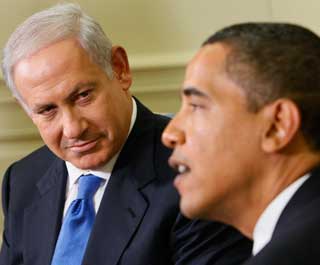Editor’s note: Jonathan Schanzer, a former terrorism analyst at
the U.S. Treasury, is vice president for research at the Foundation for
Defense of Democracies. He tweets at @JSchanzer. The views expressed are
his own.
Has the Palestinian-Israeli conflict finally entered the post-Oslo
Accords era? In the Middle East, nothing is dead until it’s buried, but
several troubling signs are pointing in that direction.
The game-changer was Palestine Liberation Organization (PLO) Chairman
Mahmoud Abbas’ historic mission upgrade at the United Nations General
Assembly on November 29
of last year. The upgrade merely afforded the PLO, which sets foreign
policy for the Palestinians, status akin to the Vatican as a non-member
observer. Since then, however, the PLO has enacted several changes that
may make the 1994 Oslo impossible to resuscitate.
Within days of his U.N. victory, Abbas
requested that the United Nations begin referring to the Palestinian
Authority government as the
“State of Palestine.”
That may not sound like much, but it means that the PLO has scuttled
the Palestinian Authority, the interim government put in place by the
Oslo Accords, and the cornerstone of Palestinian-Israeli negotiations
since 1994.
The Oslo Accords were built upon the premise that U.S.-led diplomacy
between Israel and the PLO would help take the Palestinian Authority
from interim government to statehood through a bilateral process.
More from CNN: Palestinian move doesn't solve anything
Here’s where it gets tricky. The “State of Palestine” is not the
caretaker government Israel is contractually obliged to deal with in the
Oslo Accords. Moreover, the bilateral process stipulated in Oslo has
been outwardly violated.
It is perhaps for these reasons that
Shawan Jabarin,
director of Al Haq, a human rights organization in Ramallah, expressed
concern about potential “legal and political complications” and a “lack
of clarity that needs to be sorted out.”
The complications don’t end there. Abbas recently issued a decree that all stamps (currently under production in Bahrain),
signs, and letterheads will be changed to reflect the new name. The
move, according to one Palestinian official, was aimed at enhancing
Palestinian “sovereignty on the ground,” and was a step toward “real independence.”
The Palestinian Economic Council for Development and Reconstruction, an aid institution more commonly known as PEDCAR, was reportedly the first Palestinian institution to comply with Abbas’ decree. The Palestinian Ministry of Information has followed suit.
Abbas also reportedly ordered new passports and identity cards, which
would have “State of Palestine” emblazoned upon them. The Israelis
howled with disapproval, and
Abbas appears to have backed down for now.
Still, the PLO chief may not be done making moves.
The PLO’s official mouthpiece, WAFA,
ran a piece on January 5
stating that, “an earlier decision has been reached [by the PLO] to
delegate to the [PLO] Central Council the duties of the Palestinian
Authority’s government and parliament.”
If this is true (and two senior Palestinian insiders say it is),
Abbas appears to be consolidating power by facilitating the transfer of
key components of the Palestinian Authority into the hands of the PLO,
which is not subject to public scrutiny in the way that the PA has been
since its inception in 1994.
Abbas would never frame it this way, of course. He would claim that
he seeks to shut down the PA in the face of continued Israeli settlement
construction.
By one count,
Abbas has threatened to quit as the PA’s president or simply dismantle
the PA more than 25 times. And partisans of the Palestinian cause
support him. They say that the Palestinians should not have to ask
permission to do anything, not least from their occupiers. They roundly
support the notion that collapsing the PA would saddle the Israelis
again with the full administrative burden of the West Bank (Gaza, under
the control of Hamas is another kettle of fish).
But what Abbas’ supporters – both domestic and international – don’t
seem to realize is that, by shutting the doors of the PA, the PLO may be
leveraging its newfound status at the U.N. (not Abbas’ elected
presidential authority, which expired in 2009) to consolidate power.
The last thing anyone needs is a more muscular PLO. The PA was
created, in part, to curb the bloated PLO, which has earned a reputation
over the years as being ossified and less than transparent.
One obvious challenge now for Abbas is figuring out how far he can push this agenda without setting off alarm bells in the West.
Abbas is betting that since Hamas is the only real alternative to his
rule – thanks in large part to his refusal to help cultivate new
leadership – the West will fold. Fearing a takeover by Hamas, even the
Israelis are loath to topple him.
But there is still another challenge for the new president of the
“State of Palestine.” Winds of war are blowing in the West Bank. Ever
since Abbas challenged Israeli premier Benjamin Netanyahu by upgrading
the PLO’s status, the West Bank has been signaling that it might plunge
into revolution. Every few days, we see another report of
Palestinian violence against Israelis. Palestinian terror groups are
calling for a new intifada. And
Israeli military officials are warning that one may have already begun.
Conflict is not a foregone conclusion, however. Abbas may somehow
find a way to maintain calm in this atmosphere of growing tension. Yet
the injection of the “State of Palestine” has created a state of
confusion, with the future of the peace process, the viability of the
PA, and the power of the PLO hanging in the balance.





















